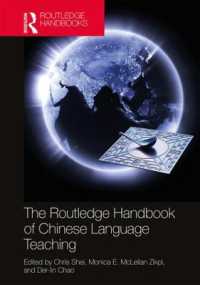- ホーム
- > 洋書
- > 英文書
- > Business / Economics
基本説明
Traces the history of economic thought, from its prehistory (the Bible, Classical antiquity) to the present day, focusing on the different views of the economy and society and on their evolution over time.
Full Description
The Wealth of Ideas, first published in 2005, traces the history of economic thought, from its prehistory (the Bible, Classical antiquity) to the present day. In this eloquently written, scientifically rigorous and well documented book, chapters on William Petty, Adam Smith, David Ricardo, Karl Marx, William Stanley Jevons, Carl Menger, Léon Walras, Alfred Marshall, John Maynard Keynes, Joseph Schumpeter and Piero Sraffa alternate with chapters on other important figures and on debates of the period. Economic thought is seen as developing between two opposite poles: a subjective one, based on the ideas of scarcity and utility, and an objective one based on the notions of physical costs and surplus. Professor Roncaglia focuses on the different views of the economy and society and on their evolution over time and critically evaluates the foundations of the scarcity-utility approach in comparison with the Classical/Keynesian approach.
Contents
Preface; 1. The history of economic thought and its role; 2. The prehistory of political economy; 3. William Petty and the origins of political economy; 4. From body politic to economic tables; 5. Adam Smith; 6. Economic science at the time of the French revolution; 7. David Ricardo; 8. The 'Ricardians' and the decline of Ricardianism; 9. Karl Marx; 10. The marginalist revolution: the subjective theory of value; 11. The Austrian school and its neighbourhood; 12. General economic equilibrium; 13. Alfred Marshall; 14. John Maynard Keynes; 15. Joseph Schumpeter; 16. Piero Sraffa; 17. The age of fragmentation; 18. Where are we going? Some (very tentative) considerations; References; Index.








